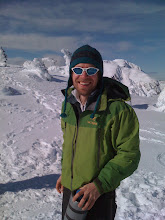"According to Carr, Christian values such as 'the virtue of prudence, the pursuit of the common good and the protection of the poor' are important contributions to the climate-change debate, and should be at the heart of policies aimed at addressing climate change," it reads.
UAF forestry prof Glenn Juday and DEC water quality manager Jim Powell will also talk, along with others representing Alaska Native concerns, industry, health care, and fishing. Representatives from each of Alaska's three dioceses will be there to listen and learn and start planning activities for their areas. The event is at the Dimond Center Hotel. Click here to learn more.
The Catholics' argument goes something like this.
At its core, global climate change is not about economic theory or political platforms, nor about partisan advantage or interest group pressures. It is about the future of God's creation and the one human family. It is about protecting both "the human environment" and the natural environment. It is about our human stewardship of God's creation and our responsibility to those who come after us.That's from a 2001 statement by the USCCB.
After the IPCC published part of its latest report this winter, the chair of the US bishops' international policy committee, Thomas Wenski, wrote to Congressional leaders and urged them to heed the report's warnings and do something. He stressed three ideas.
A Priority for the PoorSorry for the long post, but I thought this was pretty darn interesting.
. . . Poor families and children, vulnerable workers, and farmers will likely be most impacted by climate change and bear the greatest burdens as we address its causes and consequences. The poor have the fewest resources and capacity to escape the costs of climate change. We all know too well who is left behind and who pays the greatest price when disaster, floods or droughts occur.
The Pursuit of the Common Good
The challenge of global climate change is a pre-eminent example of how our debate and decisions should reflect the pursuit of the common good, rather than the search for economic, political or other narrow advantage. Our obligation to pass on the gift of God’s creation to future generations without doing irreversible harm is but one aspect of the demands of the common good. We urge you to resist and restrain predictable interest group pressures and narrow appeals. Instead, we urge to you to help build up common ground for common action to advance the common good.
The Practice of Prudence
. . . The traditional virtue of prudence suggests that we do not have to know with absolute certainty everything that is happening with climate change to know that something seriously harmful is occurring. Therefore, it is better to act now than wait until the problem gets worse and the remedies more costly.

No comments:
Post a Comment